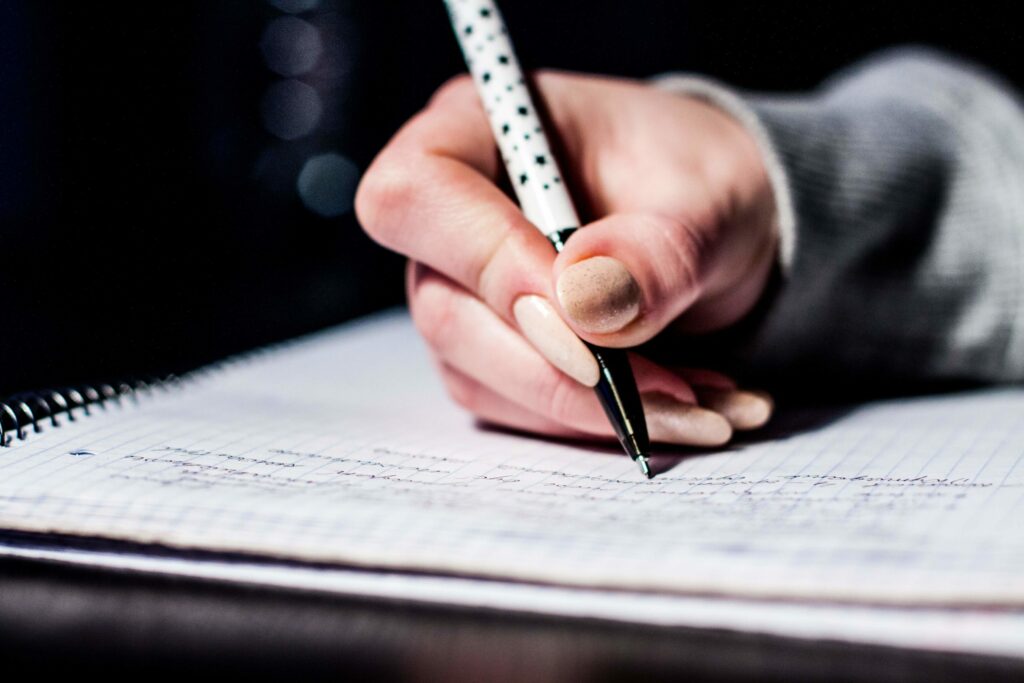Let me guess. You’ve just typed into Google: “how to revise for GCSE english literature”, am I right? And no wonder, because GCSE English Literature is one of the most important exams you’ll sit at the end of your schooling.
If you’re planning on going to one of the best UK universities for English literature, this is one of the few compulsory exams you’ll need to pass to be accepted onto your degree course.
This article outlines the top five best revision hacks for ensuring you pass your English Literature GCSE with flying colours.
1. Know what to expect
Before start revising, you have to get know what to expect. Our brains are wired for the familiar, it’s how we survived as cavepeople many moons ago, by knowing where the best hunting grounds were and the best time to hunt.
If you know what to expect on the day of your exam, your anxiety will be lowered and you’ll feel more comfortable knowing there are no surprises. Here are the basics of what to expect when sitting your English Literature GCSE exam:
- It’s a closed-book exam: You can’t take in any additional materials (such as your notes or the book you’ve annotated). Any reading materials will be given to you during the exam.
- You will sit two papers: Paper 1 and Paper 2, each assessing different criteria.
A breakdown of what to expect for each paper:
Paper 1:
- Written exam for 1 hour 45 minutes
- 64 marks to get
- 40% of your English Literature GCSE grade
- Section A Shakespeare: You will answer one question on a play of your choice (this is the play you will have studied in school). You will be required to write in detail about an extract from the play and then write about the play as a whole.
- Section B The 19th-century novel: You will answer one question from a novel of your choice (this will be a novel you have been reading in school). You will be required to write in detail about an extract from the novel and then write about the novel as a whole.
Paper 2:
- Modern prose or drama texts
- The poetry anthology
- Unseen poetry
- Written exam lasting 2 hours 15 minutes
- 96 marks
- 60% of GCSE
- Section A Modern texts: students will answer one essay question from a choice of two on their studied modern prose or drama text.
- Section B Poetry: You will answer one comparative question on one named poem printed on the paper and one other poem from your chosen anthology cluster.
- Section C Unseen poetry: Students will answer one question on one unseen poem and one question comparing this poem with a second unseen poem.
2. Work backwards
Setting goals is an extremely important part of revision. In fact, Tony Robbins said it well when he stated that “setting goals is the first step in turning the invisible into the visible.” (Tony Robbins). Again, it’s about showing ourselves that there are no surprises. We get comfortable when we know what to expect, giving us a strong sense of direction.
There’s a reason why this quote is one of my favourites. Setting goals and having a deep understanding of our direction means we can always determine if we are on the right track or going off course.
So how do you set goals for your English Literature GCSE exam? First, you need to start with the rubric or grading criteria. This is what the markers will assess you on. Look at the four assessment objectives you will be marked on below.
AO1: Read, understand, and respond to texts. Students should be able to maintain a critical style and develop an informed personal response using textual references, including quotations, to support and illustrate interpretations.
AO2: Analyse the language, form, and structure used by a writer to create meanings and effects, using relevant subject terminology where appropriate.
AO3: Show understanding of the relationships between texts and the contexts in which they were written.
AO4: Use a range of vocabulary and sentence structures for clarity, purpose, and effect, with accurate spelling and punctuation.
It’s important you understand these grading markers. We recommend re-writing them in your own words. Replace any difficult words with synonyms or phrases you’re more familiar with.
The table below outlines how your mark will be determined.
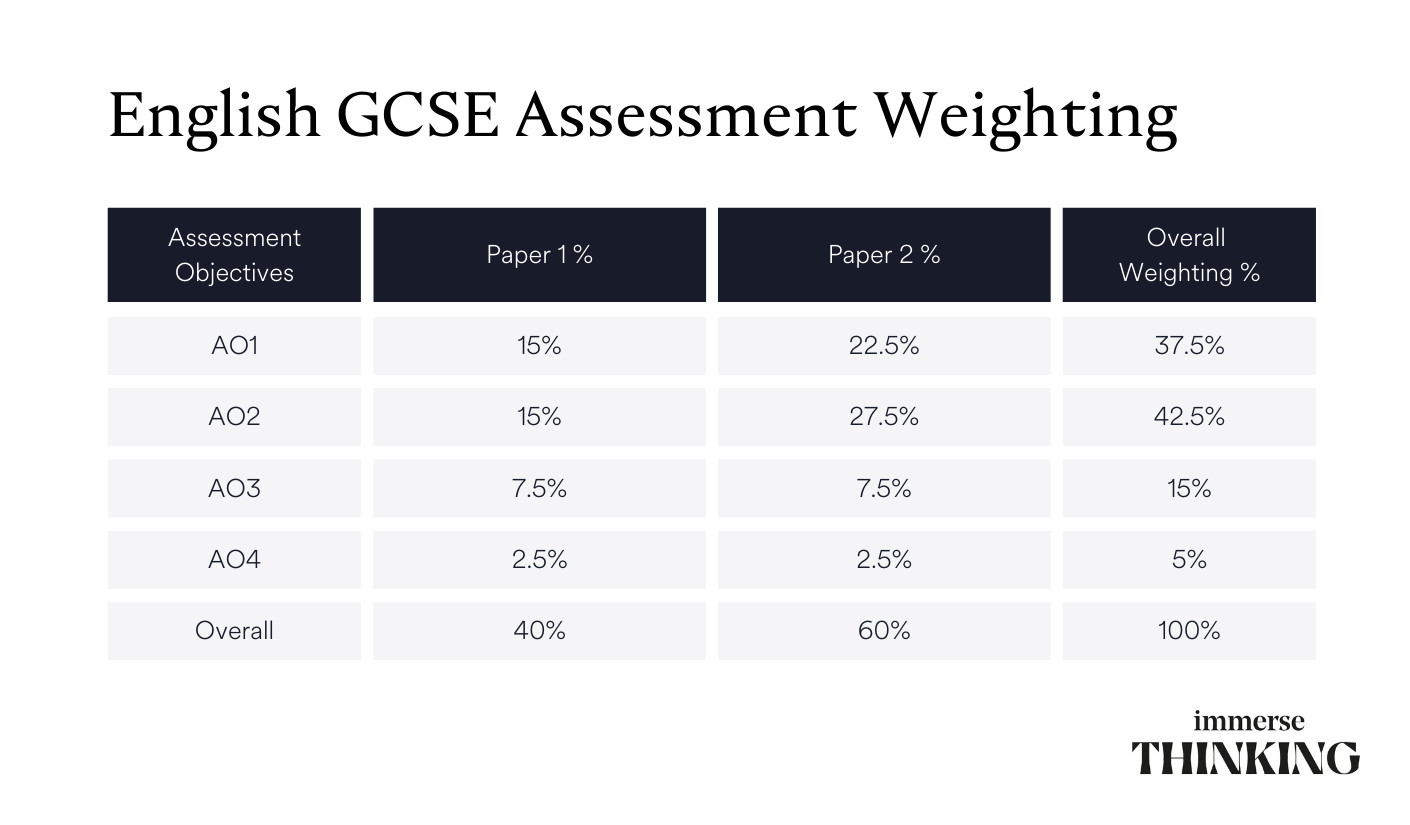
As you can see from the table, some assessment objectives have more “weighting” than others. This means that the examiner will be looking for certain skills over others.
Look at the table above. Which AO makes up most of your mark? Which objective is the least graded? We’ve put together a diagram below to help you identify this more easily.
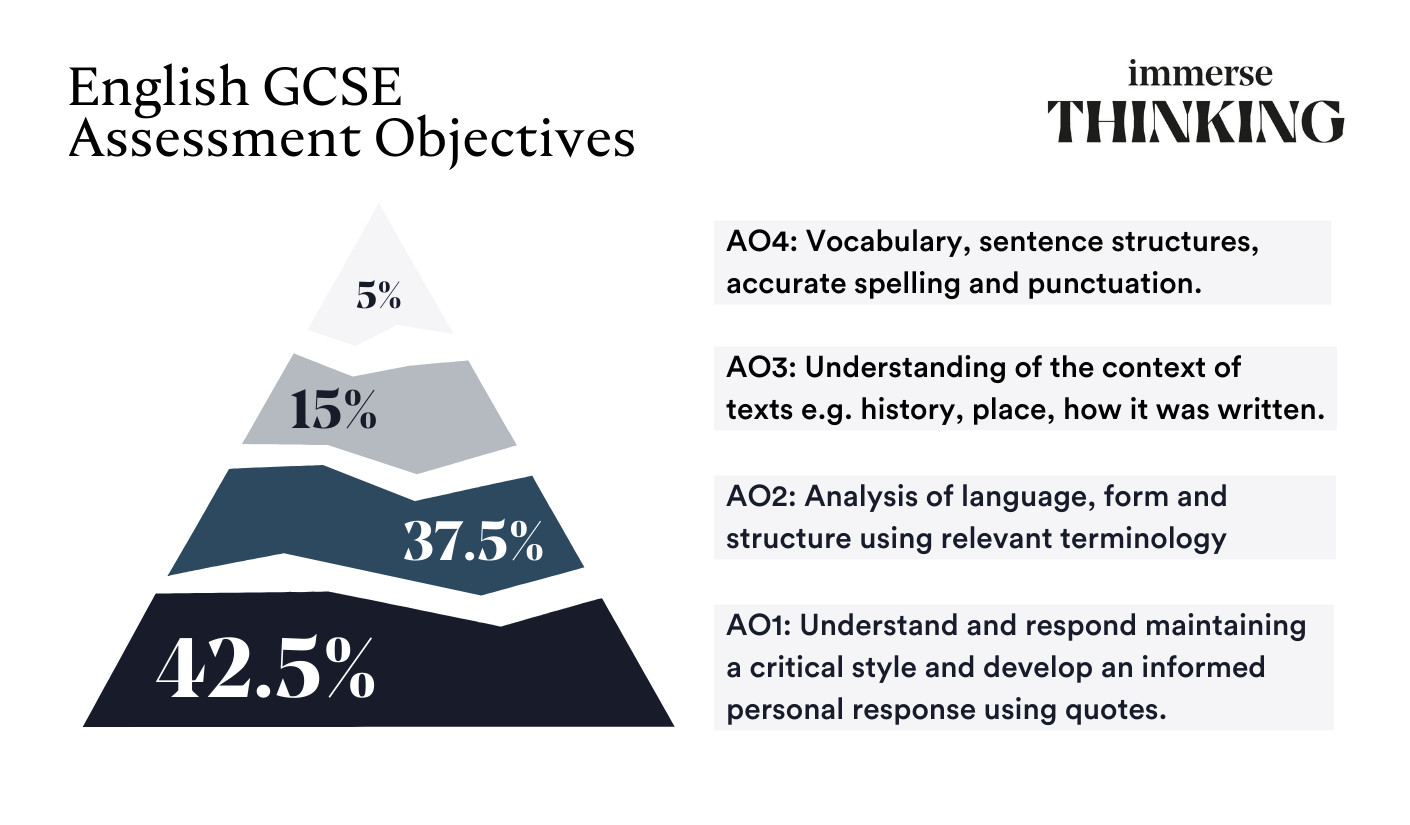
As you can see from the diagram, AO1 has more weighting than any other assessment objective. This tells you that it’s far more important to understand the text and be able to critically analyse it with your own personally informed response than it is to write with perfect spelling, punctuation, and vocabulary.
This means you should spend more time reading the book/poem/play, asking questions about it, and brushing up on your own opinion of the text than it is building vocabulary and writing skills.
Understanding which assessment objective carries the most marks is important when prioritizing your revision for the GCSE English Language exam.
3. Set goals
Okay, so you now know what to expect on your GCSE English Literature exam, and you know what you’re being assessed on, but how do you set effective goals that help you to stay on track?
The next step is determining what grade you want (or need) to get accepted at your chosen university or apprenticeship.
Below is an outline of the possible grades you can get and what you need to do to achieve that grade. It’s a good idea to write down the descriptor that matches your desired grade and stick it somewhere visible to help you stay on track regarding revising.
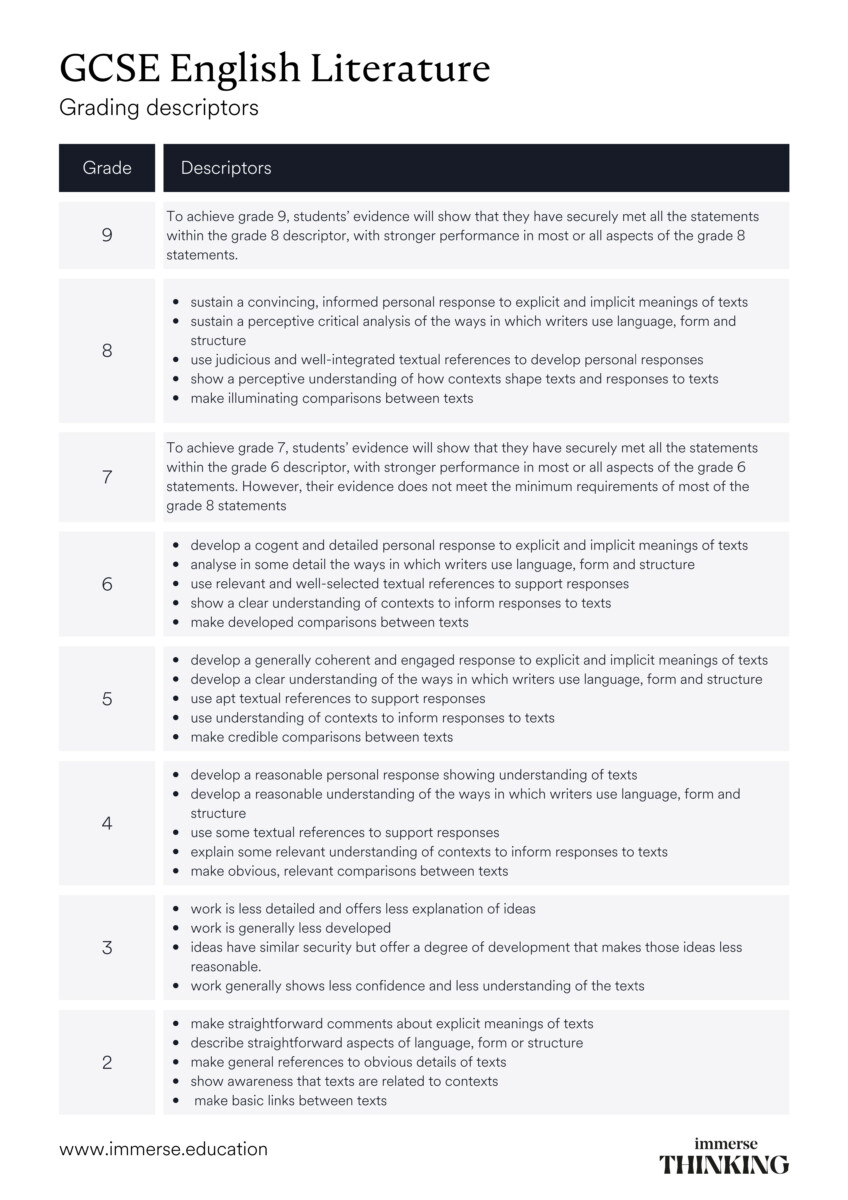
Join the Immerse Education 2025 Essay Competition
Follow the instructions to write and submit your best essay for a chance to be awarded a 100% scholarship.

4. Paint the bigger picture
There’s a reason that most of these tips aren’t yet talking about making revision cards or recommending a particular revision resource, it’s because your intrinsic motivation is truly what matters when it comes to your personal success.
If you know what to expect and have clear goals, then nothing can sway you from your chosen path, but to ensure these goals mean something, it’s essential to paint a bigger picture of why passing this particular exam is important to you.
Vision boards are a great way for visual learners to see their goals in plain view, and they consist of images and inspirational quotes that show you achieving your goal. Here’s an example of what a vision board might look like:
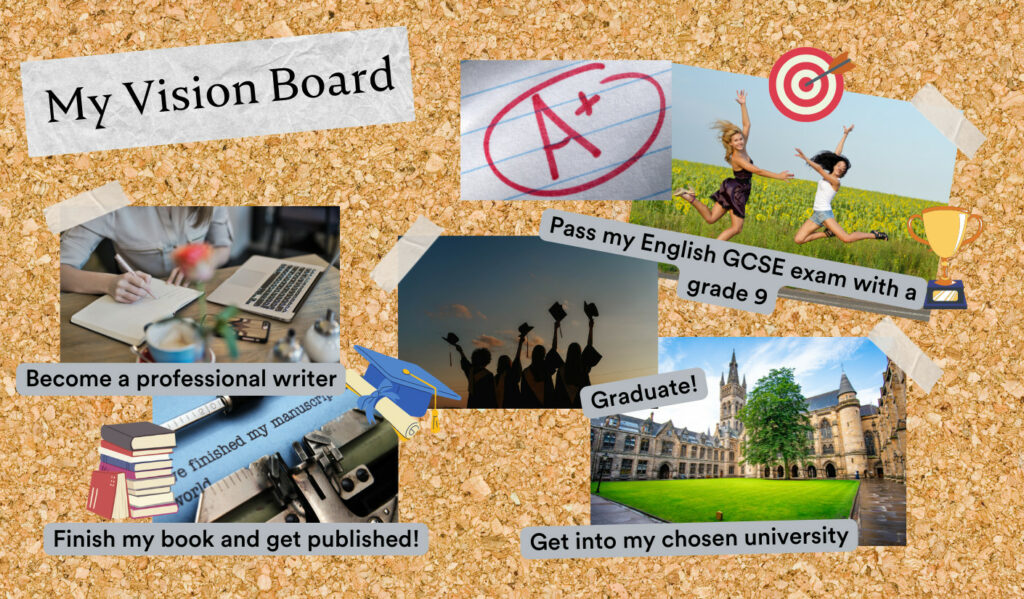
If you’re not the vision board type, make a list or create a diagram in your notebook or on Canva.
5. Read, read, read (and take notes)
Now you have a clear vision and direction. You must get familiar with the texts you will be assessed on. No, it isn’t enough to watch the movie adaptation! Read the books, three times over if you can! Take notes, discuss it with your friends, and test yourself on the following:
- Setting
- Characters
- Plot
- Conflict
- Word choice
Always refer back to this question: What choices has the writer made and what effect does this have on the reader?
If you understand the texts well enough and have developed an informed, personal response, you’re likely to do well on your exam. And, of course, this is a tip that is repeated in our a-level revision tips for english literature.















